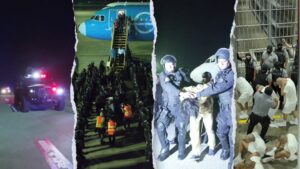
The recent events surrounding the deportation of Venezuelan nationals have stirred a pot of controversy. The White House has denied any wrongdoing in the matter. They insist they complied with a judge’s order regarding the use of the 1798 Alien Enemies Act.
The situation escalated when Judge James Boasberg temporarily blocked this law’s application. This law was initially meant for wartime actions and is rarely invoked today. In this case, 261 migrants were already on a plane that had left U.S. airspace.
White House spokesperson Karoline Leavitt stated there was no basis to claim the government violated the court’s order. Did the administration act according to protocol, or was this just a case of legal oversight? This latest tick-tock of interactions raises eyebrows while hearing the perspectives of both sides.
Among those deported were 137 individuals directly linked with the controversial Alien Enemies Act. Additionally, 101 Venezuelans left under Title 8 of immigration law. Adding another layer, 21 members of the notorious Mara Salvatrucha gang were included in this flight, along with two leaders from the Tren de Aragua criminal organization.
Could the administration be sending a message with these deportations? El Salvador’s President, Nayib Bukele, certainly seemed to think so. He shared a three-minute video showing how the deportees were received in his country. The clip depicted security personnel shaven heads and a strict reception upon arrival.
Furthermore, Bukele took a shot at the American judicial system. On social media, he posted, ‘Oopsie… Too late,’ directly mocking Judge Boasberg’s order. It’s hard not to feel a sense of tension rising between the two nations. Could this be a glimpse into deeper diplomatic issues?
U.S. Secretary of State Marco Rubio praised Bukele, calling him a key ally in the region. Their relationship appears fortified by these deportations. But what does this mean for the broader geopolitical landscape? This leads to questions of legality and the moral implications of using a law from 1798.
The U.S.’s approach not only poses legal questions but it’s also drawn condemnation. The Venezuelan government equates these deportations with crimes against humanity, making it a contentious topic on both sides. How can a nation decide which laws apply when their current frameworks seem outdated?
As debates continue in the halls of power, the lives of those deported remain at the forefront. Their stories must not be lost in the noise of politics. What will be the long-term repercussions for these individuals and for U.S.-Venezuelan relations remains uncertain.
Leave a Comment